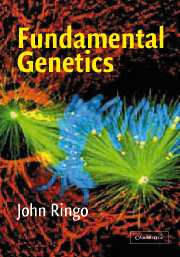Book contents
- Frontmatter
- Contents
- Preface
- Acknowledgments
- Chapter 1 Life Forms and Their Origins
- Chapter 2 Nucleic Acids
- Chapter 3 Proteins
- Chapter 4 Simple Chromosomes
- Chapter 5 Chromosomes of Eukarya
- Chapter 6 Genome Content
- Chapter 7 RNA Synthesis 1: Transcription
- Chapter 8 RNA Synthesis 2: Processing
- Chapter 9 Abundance of RNAs in Bacteria
- Chapter 10 Abundance of RNAs in Eukarya
- Chapter 11 Protein Synthesis
- Chapter 12 DNA Replication
- Chapter 13 Chromosome Replication
- Chapter 14 Molecular Events of Recombination
- Chapter 15 Micromutations
- Chapter 16 Repair of Altered DNA
- Chapter 17 Reproduction of Bacteria
- Chapter 18 Horizontal Gene Transfer in Bacteria
- Chapter 19 Cell Cycles of Eukarya
- Chapter 20 Meiosis
- Chapter 21 Chromosomal Abnormalities
- Chapter 22 Life Cycles of Eukarya
- Chapter 23 Reproduction of Viruses
- Chapter 24 Genetic Processes in Development
- Chapter 25 Sex Determination and Dosage Compensation
- Chapter 26 Cancer
- Chapter 27 Cutting, Sorting, and Copying DNA
- Chapter 28 Genotyping by DNA Analysis
- Chapter 29 Genetically Engineered Organisms
- Chapter 30 Genomics
- Chapter 31 Behavior of Genes and Alleles
- Chapter 32 Probability and Statistics Toolkit
- Chapter 33 Genes, Environment, and Interactions
- Chapter 34 Locating Genes
- Chapter 35 Finding and Detecting Mutations
- Chapter 36 Cytoplasmic Inheritance
- Chapter 37 Genetic Variation in Populations
- Chapter 38 Mutation, Migration, and Genetic Drift
- Chapter 39 Natural Selection
- Chapter 40 Quantitative Genetics
- Chapter 41 Speciation
- Chapter 42 Molecular Evolution and Phylogeny
- Glossary
- Index
Chapter 40 - Quantitative Genetics
Published online by Cambridge University Press: 05 June 2012
- Frontmatter
- Contents
- Preface
- Acknowledgments
- Chapter 1 Life Forms and Their Origins
- Chapter 2 Nucleic Acids
- Chapter 3 Proteins
- Chapter 4 Simple Chromosomes
- Chapter 5 Chromosomes of Eukarya
- Chapter 6 Genome Content
- Chapter 7 RNA Synthesis 1: Transcription
- Chapter 8 RNA Synthesis 2: Processing
- Chapter 9 Abundance of RNAs in Bacteria
- Chapter 10 Abundance of RNAs in Eukarya
- Chapter 11 Protein Synthesis
- Chapter 12 DNA Replication
- Chapter 13 Chromosome Replication
- Chapter 14 Molecular Events of Recombination
- Chapter 15 Micromutations
- Chapter 16 Repair of Altered DNA
- Chapter 17 Reproduction of Bacteria
- Chapter 18 Horizontal Gene Transfer in Bacteria
- Chapter 19 Cell Cycles of Eukarya
- Chapter 20 Meiosis
- Chapter 21 Chromosomal Abnormalities
- Chapter 22 Life Cycles of Eukarya
- Chapter 23 Reproduction of Viruses
- Chapter 24 Genetic Processes in Development
- Chapter 25 Sex Determination and Dosage Compensation
- Chapter 26 Cancer
- Chapter 27 Cutting, Sorting, and Copying DNA
- Chapter 28 Genotyping by DNA Analysis
- Chapter 29 Genetically Engineered Organisms
- Chapter 30 Genomics
- Chapter 31 Behavior of Genes and Alleles
- Chapter 32 Probability and Statistics Toolkit
- Chapter 33 Genes, Environment, and Interactions
- Chapter 34 Locating Genes
- Chapter 35 Finding and Detecting Mutations
- Chapter 36 Cytoplasmic Inheritance
- Chapter 37 Genetic Variation in Populations
- Chapter 38 Mutation, Migration, and Genetic Drift
- Chapter 39 Natural Selection
- Chapter 40 Quantitative Genetics
- Chapter 41 Speciation
- Chapter 42 Molecular Evolution and Phylogeny
- Glossary
- Index
Summary
Overview
In natural populations of sexually reproducing organisms, individuals differ phenotypically in a quantifiable way. Most variable phenotypes of interest (e.g., size, fertility, and longevity) can be measured on a continuous scale and are influenced by many genes and a host of environmental factors. Usually, no single gene is a major source of natural variation for a phenotype (major gene), but it is possible to assess the magnitude and nature of the multigenic causes of natural variation for that phenotype, where many genes, each with a tiny effect, act together.
The goal of quantitative genetics is to measure the relative contributions of genotype and environment to phenotypic variation in a population of organisms, breaking down phenotypic variance into genetic and environmental components. The heritability of a trait is the fraction of phenotypic variance due to genes for a particular population of organisms in a particular environment. This genetic variation can be subdivided into components, notably additive effects, dominance, and epistasis. A further component of the environment is genotype-environment interaction. Natural selection can bring about evolutionary change in a trait if and only if a population has additive genetic variation for that trait. Genes that underlie natural quantitative variation for a phenotype can be mapped genetically to quantitative trait loci (QTL).
Quantitative Models
For any quantitative phenotype, there is usually natural genetic variation. Most of the genes contributing to this variation remain anonymous, as the effects of any one of them on quantitative variation are too small to observe directly, even though the concerted effects of many genes are big enough to measure.
Information
- Type
- Chapter
- Information
- Fundamental Genetics , pp. 383 - 394Publisher: Cambridge University PressPrint publication year: 2004
Accessibility standard: Unknown
Why this information is here
This section outlines the accessibility features of this content - including support for screen readers, full keyboard navigation and high-contrast display options. This may not be relevant for you.Accessibility Information
- 1
- Cited by
